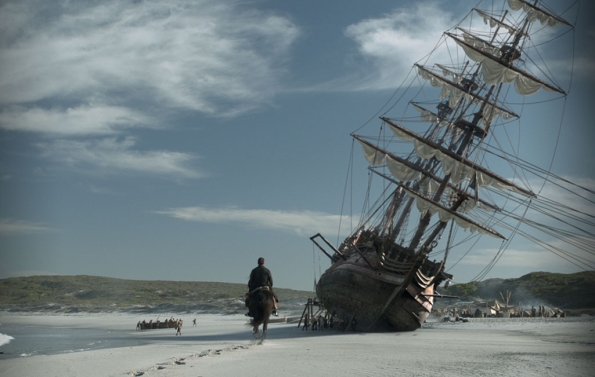Counter-colonial Heistcrawl: previous high scores
One of the reasons I’ve been blogging so little here of late is that it inevitably takes me a whole day to write a post. I’m going to try to keep this one short because it’s a simple point, relevant to the campaign I’ve just started running (after 15 years gestation – that might be why I’m reluctant to start campaigns, too).
Have you seen Black Sails? It’s trashy but better than I expected (see previous post). In fact on the trash violence to interesting plot axis, I think I prefer it to Game of Thrones.
It so happens I’m discovering it just as my son is re-playing Assassin’s Creed 4 (the pirate one – Black Flag). Both treat the same loosely-historical events in fairly similar ways – the struggle between the pirate anarchs (sometimes dignified as a republic) of Nassau and the nascent British Empire, the latter personified by Woodes Rogers with his pardons and pirates-turned-king’s men. The historical events take place during the period 1715-1720. The TV and video game versions seem to compress it all into a few months.*
So. 1715 is a terrible time to be starting a pirate republic:
- there’s more peace between the big pirate empires – Britain, France and Spain – than in the previous hundred years or more. As a group they are disinclined to welcome a competitor (cf. WW1, which was really about not wanting to set a place at the Great Power table for upstart Germany).
- although there are plenty of malcontents in the American Colonies, the local power-holder landowners still look to the homeland for preferment – if you want to start up an American Revolutionary Republic in 1715 you first have to engineer a real peasant uprising and kill all the aristos and then still have resources and trade networks to fight off the British counter-attack. In case you’re thinking the actual American Revolution offers a better model, note that it’s a tax revolt by an already-established gentry class – people who already have a working political system for controlling the masses, which they can adapt to new ends. Every fort they can take by ideology rather than force is part of a political machine the English built for them.
- the British are already thoroughly networked across the Caribbean and if nobody stops them they will certainly colonize it all. They have a lot of ships, a lot of places to repair them, and a lot of resources to recruit crews. It seems anarchic and it’s definitely full of holes a ship or captain can hide in, but it’s the anarchy of capitalism – there are in fact even venture capitalists in London and Boston trying to exploit the temporarily-anarchic situation by sponsoring “privateer” agents abroad, which is as sure a sign as you’re likely to find anywhere that the pirate bubble is about to burst.
Both Black Sails and Black Flag do a good job of peeling apart the micropolitics of trust that are the basic problem for any gang of murderhobos that wants to turn into a working polity – not everybody understands the same things at the same time. Many people just want to be murderhobos. Nobody wants to invest their treasure in a communal chest. Independent ship captains already command pirate republics (wooden ones) – why should they want to be represented by some wig-wearing tax-collector on land?
But neither one really addresses the bigger picture of why a republic in Nassau is doomed to failure, while one that encompasses the eastern seaboard of North America just might work. Fair enough, dramatically – the pirate genre is really all about Great Man history, not long-reaching economic forces – but that bigger picture is important to the kind of exercise I would like CCH to be. In CCH I want the players to seriously consider first what they have to do to survive the day, and later what they have to do to make a safe space for themselves and people like them. And they can learn (anachronistically) from the mistakes of Blackbeard, Vane, Anne Bonny and all…
- the Caribbean pirates never try to make allies, except among equals. They probably fear to lose their independence (fair) but by victimizing everyone indiscriminately, they make themselves the common enemy of all. They do not learn to play politics. England (later Britain) tries several times to recruit them when its own prospects are uncertain. The pirates keep refusing because they rightly guess that Britain will never offer a really good deal – their problem is they lack the presence of mind/discipline to lie to her convincingly (with some exceptions).
- they’re trying to establish themselves in the very heart of the imperial project. Caribbean sugar is the starter fuel for colonizing the Americas. That’s why there’s so much merchant shipping to prey on, but it’s also the resource that the imperialists will fight hardest to keep. Basically the Navy will come here sooner or later, which is not true of Madagascar or Mauritius or even the coast of India if you know who to attack (smaller native capitalists, Mappilas, the Portuguese) and who not to attack (the British or French) there.
- they declare a tiny castle outpost in defiance of nation states. There’s really no way they can get big enough to become a real threat because they’re not ambitious enough and they’re too public, too early. Compare and contrast with Germany, which definitely won its pirate phase – Prussia was a dead state in 1814. It was reconstructed after Napoleon to act as a buffer between Russia and Europe. It reformed its armies (took care of getting the best equipment), seized a bunch of German-speaking pocket states that the big players didn’t care about (grew in the dark) and focused hard on industrializing (exploited a technological weak point) until it was big enough to be a threat… and then it moved (in restrained ways as long as Bismarck lived) on the big, old players.
- ETA: my son makes an excellent point: Nassau is also never self-sufficient. Black Sails suggests it could be if it made an alliance with the planters of the island but it doesn’t, so there you are.
I’m not saying that CCH must follow my vision of a teleological course, I’m not saying it’s the game where you emulate Prussia or anything like that, I’m just saying the pirates of Nassau show some classic traps.
1610 (the opening date for CCH) is a much kinder moment to start than 1715, if you did want to build a strong, working polity in Southeast Asia. The Spanish and Portuguese have been annoying the locals for a century and all they’ve got to show for it is a trading post empire of isolated fort-factories sitting on a set of resource-flow routes – one for cinnamon, one for pepper, one for dye-woods…. not the kind of thoroughly interlinked plantation colony Britain will develop in the Americas a hundred years later. The legal control environment is not so much a Swiss cheese as a few strands of spiderweb stretched across a dark and unknown jungle. Nobody even knows all the kingdoms out there, and inside those kingdoms, nobody has hegemonic control of anything – the general political mode is to have villages pay tribute to warlords when they can be forced to, not nation states with defended borders. Stone forts are rare (and are generally either European colonial, Chinese, Japanese or Mughal).
Perhaps most critically, the fundamental basis of power is not land or even money but manpower. That’s what local rulers fight over, and what Chinese commercial networks export, in return for unique island products. It’s what the European colonists really need (even if it’s not what they most desire). There is rich loot to be grabbed in the form of spices, Spanish silver, Indian gold, sea cucumbers (the Chinese love ’em), perfumes, dyes, cloth etc. so there’s ample opportunity for piracy, trade and smuggling, but the key to long-term success – the key to independent survival – is nakedly and unquestionably uniting people.
* There’s basically one literary source for all this “history” and it’s superbly written, so it’s ideal genre fiction writing fodder and it sparked a pirate genre that’s still playing out today. Seriously, Captain Charles Johnson was the Tolkien of 1725 (or maybe he was Daniel Defoe all along – the case is not definitively settled) – if you want to be an instant expert on the “golden age,” go read him (the paperbacks are cheap, the etexts only cost you time).
** Black Sails has some gorgeous imagery, though. The carved ivory title sequence is a delightful synthesis of familiar elements into a typically 18th century harmonious, murderous whole.


Be with me, Darling, Early and late
Online Shopping Engine
Price Comparison Engine
Best Price Online Shopping Engine
Best Price Online Shopping